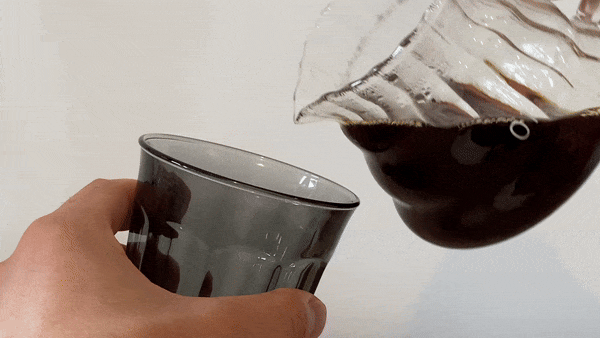How to Brew Coffee Using the Pour-Over Method
Important Update: After writing this article, I experimented a lot and now use an updated recipe. First, I’ve changed the water-to-coffee ratio to 1:16. In my opinion, this is the best ratio for a balanced flavor. You can experiment yourself and use this calculator, but my personal favorite is 1:16 (or 15 g of coffee per 240 ml of water) – it’s simply the perfect ratio. Second, I’ve realized that pouring water in intervals is essential. In short, here’s the recipe I now use every day:
- Pour 40 ml of water, wait until 0:30
- Pour another 40 ml of water, wait until 1:00
- Pour 40 ml of water, wait until 1:30
- Pour 40 ml of water, wait until 2:00
- Pour 40 ml of water, wait until 2:30
- Pour 40 ml of water, wait until 3:10
Grind size: 25-26 clicks on the Comandante C40 MK4 (the grinder is a very important part!). All other nuances below are still relevant. When I have time, I’ll write a new, updated article about my current pour-over brewing method.

Pour-over is a popular manual coffee brewing method that uses a dripper, sometimes referred to as a Hario V60—named after one of the most well-known manufacturers. Drippers come in various shapes, sizes, and materials, including plastic, ceramic, and glass. While pour-over brewing is similar to using a Chemex, the flavor profile can differ slightly, often highlighting floral and fruity notes.
What You’ll Need:
- Coffee (for best results, use whole beans and grind them just before brewing)
- Coffee grinder (a high-quality hand grinder is better than a cheap electric one)
- Coffee dripper (sizes 01 or 02 are optimal)
- Paper filter (should match the size of the dripper)
- Water (choosing the right water is crucial for coffee brewing)
- Scale (accurate measurements are key; use a scale with 0.1 g increments)
- Timer (you can use your phone, but a built-in timer on the scale is more convenient)
- Kettle with a thin spout (greatly simplifies the pour-over process)
Grind Size
For pour-over coffee, a medium grind is ideal—coarser than espresso but finer than a French press. However, the grind size may need adjustment depending on your taste preferences, so experimentation is encouraged.
It’s important not to use different grind sizes within one brew, as this can result in unpredictable flavors. A manual coffee grinder with adjustable ceramic burrs, like those made by Hario, is the best option for achieving consistent results.
Coffee Dosage
To brew a cup of coffee with a V60 dripper, the recommended ratio is 15 grams (0.5 oz) of coffee per 250 ml of water. Avoid measuring by eye, as slight deviations can significantly affect the taste. A precise scale is essential for consistent brewing.
If you adjust the amount of coffee, be mindful that the grind size may also need to be altered to maintain the correct brewing speed. The more coffee you use, the coarser the grind should be, but the 15g to 250ml ratio is a great baseline for achieving excellent results.
Water Temperature
Water temperature plays a crucial role in the pour-over process. The optimal temperature range is 92-95°C (197-203°F). To reach this temperature, bring water to a boil and let it cool for about a minute. Using a thermometer for precise temperature control is recommended, and some kettles with thin spouts even come with built-in temperature sensors for convenience.
Coffee Distribution
Begin by placing a paper filter in the dripper and rinsing it with 200 ml of hot water (above 90°C) to eliminate any paper taste and prepare the filter. Discard the rinse water before brewing.
Next, add the ground coffee to the filter and gently tap the dripper to level the grounds. You can also use a stick or stirrer to evenly distribute the coffee grounds.
Blooming
The first step in brewing is blooming—a crucial process that enhances the coffee’s flavor and promotes even extraction. To bloom, pour water in a 3:1 ratio relative to the coffee’s weight. For example, if you’re using 15 grams (0.5 oz) of coffee, pour 45 grams (1.6 oz) of water over it. Start your timer and let the coffee bloom for 30 seconds before continuing.
Water Pouring
After the bloom, pour the remaining water in a circular motion, starting from the center and moving outward. Keep pouring until the total volume of water reaches 250 ml.
There are two main pouring methods:
- Single pour: Pour all the water at once.
- Interval pour: Pour water in stages. The interval method generally enhances extraction, drawing out more flavors from the coffee.
Brewing Time
The ideal brewing time for pour-over coffee is between 2.5 and 3.5 minutes, with 3 minutes being the sweet spot. If you’re brewing decaffeinated coffee, you may want to extend the brewing time to 4 minutes for a fuller flavor.
Once the brewing process is complete, gently shake the coffee in the pot or glass to aerate it before serving.